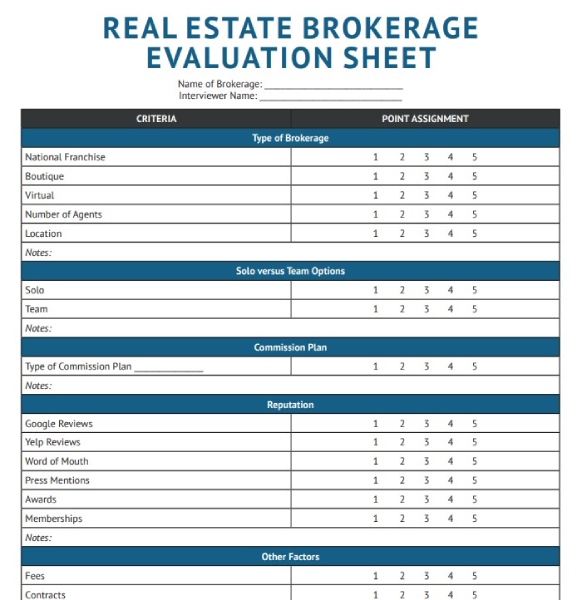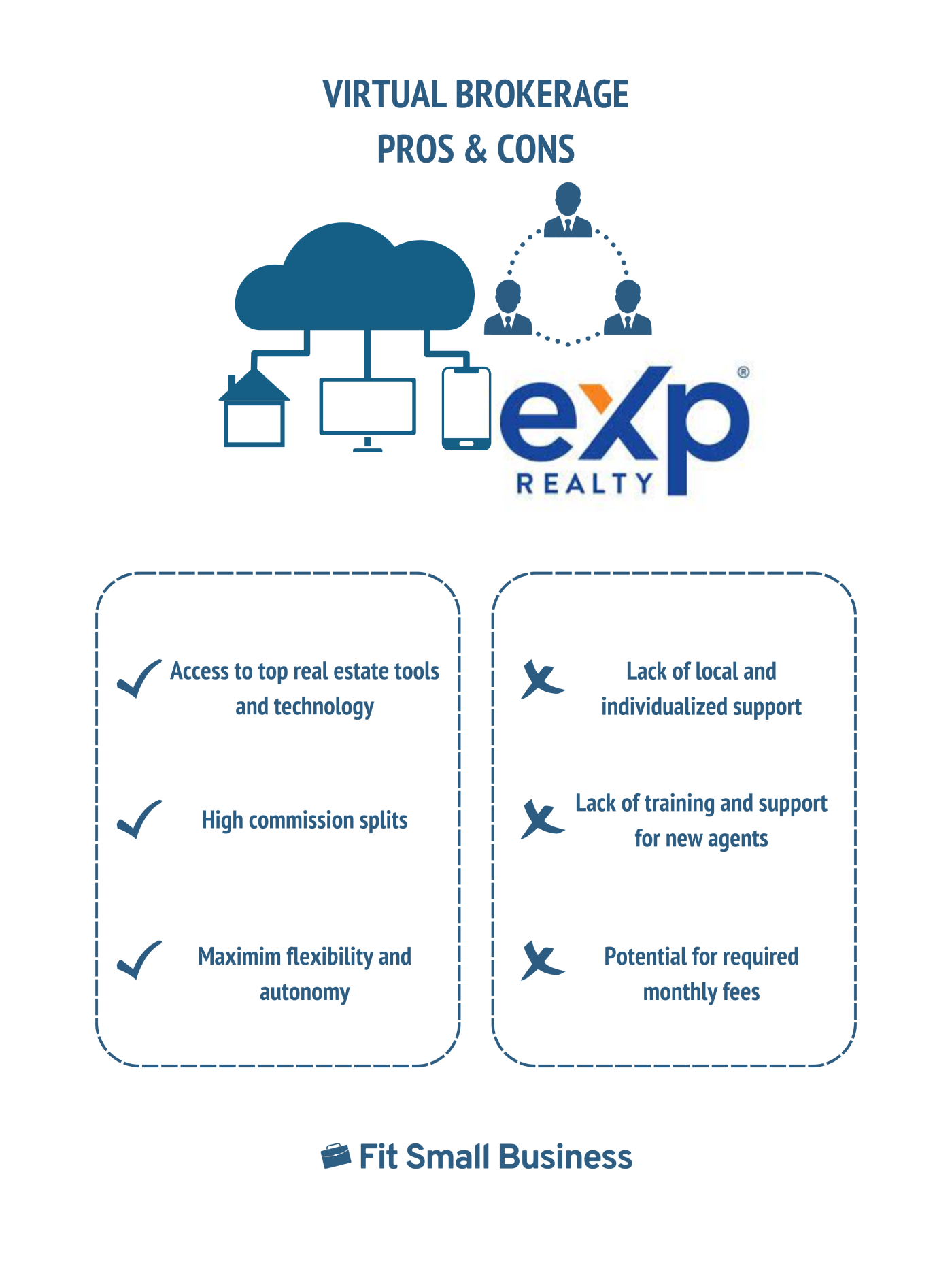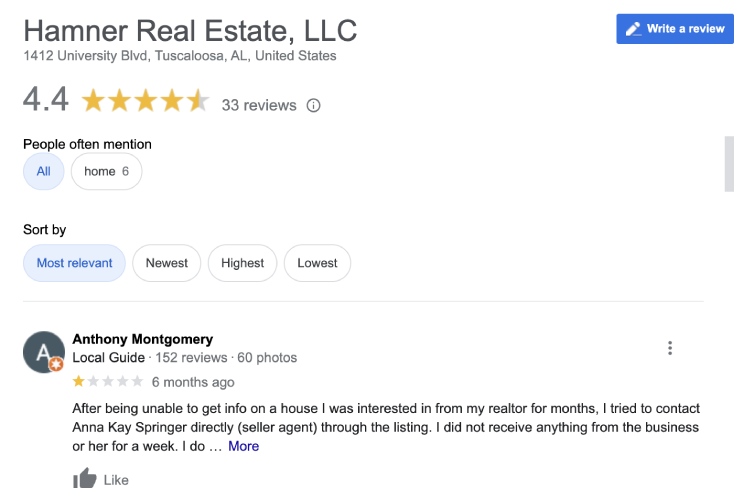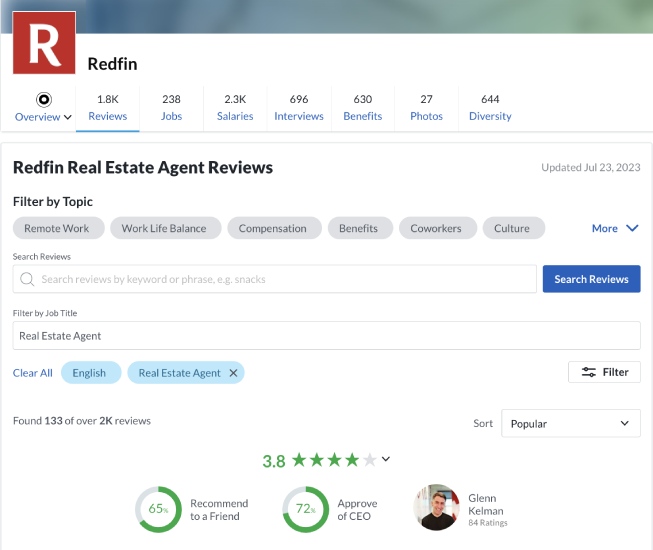New and inexperienced real estate agents should review each brokerage’s structure, commission plans, and overall reputation to find and choose the right brokerage to work for. Before deciding, you should look into other success factors, such as a brokerage’s online presence, fees, contracts, and lead distribution strategies. Remember that choosing the right brokerage greatly impacts your immediate success and long-term future in the industry. Follow the six steps below to learn how to choose a real estate company to work for.
1. Create & Use an Evaluation Rubric to Help Decide on Your Brokerage
Choosing the best brokerage for you and your business is not a one-size-fits-all approach. Some agents prefer a franchise brokerage over a boutique brokerage; others don’t mind paying hefty desk fees in exchange for access to an office with supplies and high-quality training. Our rubric was designed to work around each agent’s diverse needs.
Print it out and determine which characteristics best suit your needs on a scale of one to five. As you take notes during your research and throughout the interview process with each brokerage, rate each criterion based on this scale to give a score for each brokerage. This will help you decide which brokerage is best for you and your real estate business.
2. Decide Which Type of Brokerage to Target
Real estate agents and salespeople must have a sponsoring broker to represent clients in real estate transactions. For new real estate professionals, choosing a real estate brokerage to work for can be the key to success or a central point of struggle. Choosing the right company is crucial, so understanding the different types of real estate brokerages and their pros and cons is essential.
Learn and evaluate the differences between national franchise, boutique, and virtual brokerages to decide which option is best for you.
Franchise brokerages are large national companies that sell the rights to use their name, branding, and business model to brokers like RE/MAX, Century 21, and Keller Williams. After the company sells a franchise to an individual broker, it charges them a set percentage for every deal closed in the office. While many franchises are independently owned, almost all follow the rules and regulations the head office sets.
Who National Franchises Are Best For & Why
National franchise brokerages are best suited for new and established agents who want support from experienced mentors, access to high-quality training programs and technology, and an established reputation.
The pros and cons of working for a national franchise brokerage like Keller Williams are the following:
For those who want to minimize the costs of becoming an agent, finding a brokerage to work for that already has various real estate tools and technology in place is ideal. Franchise brokerages are also nationally recognized with solid reputations, so working for a real estate company like this can build your own trustworthy brand. Along with being part of a large, national brand, you’ll be one of thousands or hundreds of thousands of agents. For instance, there are over 188,121 Keller Williams real estate agents worldwide.
While this provides you with a large pool of people for support and camaraderie, it can also mean more competition. It also limits your autonomy to make decisions for your individual real estate business. The potential negative of establishing technology systems and tools is that you can’t experiment with different websites or lead generation platforms. Plus, reaching any company leadership beyond your brokerage can be extremely difficult.
To learn more details about popular national franchises, check out our in-depth ranking of the top six real estate companies.
Boutique brokerages are generally owned by a single broker. Examples include Core Real Estate out of Manhattan, Bayside Real Estate in Los Angeles, and @Properties in Chicago. Even though boutique brokerages can be significantly smaller in size than franchise brokerages, that doesn’t limit their sales potential. In fact, many of the most successful brokerages in the country are boutique brokerages, selling billions worth of real estate in 2023.
Who Boutique Brokerages Are Best For & Why
Boutique brokerages are ideal for real estate professionals who prefer more close-knit relationships with colleagues, hands-on training, and interaction with leadership and are focused on a specific niche market.
The pros and cons of working for a boutique brokerage are the following:
Many local boutique brokerages have a few agents working for a single brokerage, like Salt Real Estate in Edmond, Oklahoma, or Prime Residential Brokerage in Salt Lake City, Utah. Other boutique brokerages have multiple offices with a total of a few hundred or thousand agents, like Sereno, with 19 locations and more than 620 agents.
When you’re learning how to find a real estate broker to work for, you’ll find that boutique brokerages offer the widest range of support, marketing, and tools. Some offer extensive training programs and marketing systems. Others may provide only a few basic tools like a single-page website but offer complete flexibility in marketing strategies and a close-knit team environment. There is also more likelihood of finding more team camaraderie in a boutique brokerage instead of competition.
Each boutique brokerage should be evaluated individually without making assumptions about what is or isn’t included. Read our article 24 Critical Questions to Ask a Broker in a Real Estate Interview and download our free real estate brokerage interview questionnaire to be prepared and make sure you’re asking the right questions.
With the advent of software as a service (SaaS), real estate software, and the increasing reliance on online advertising, virtual brokerages are now a viable option for independent and experienced real estate professionals. Instead of working for a physical brokerage office, virtual real estate brokerages allow you to handle your real estate needs with the most flexibility and from the convenience of your computer.
Who Virtual Brokerages Are Best For & Why
Virtual brokerages are perfect for experienced agents who want ultimate flexibility, technological resources and tools, and maximum profits. A virtual brokerage may offer the best of both worlds for agents who want a high commission split and access to technology. For experienced agents with an existing reputation and pool of clientele, virtual brokerages can offer the perfect balance of flexibility and automation tools to scale their business.
Here are the pros and cons of joining a virtual brokerage firm like eXp Realty:
However, for newer agents or part-time agents, virtual brokerages may or may not be the right choice to get their business off the ground. The high-tech tools and high commissions look extremely attractive, but there is far more to consider as you learn how to find a brokerage to work for. New real estate agents usually need more localized and individualized support while they work hard to establish authority and networks in their area.
A brand-new real estate agent business must have potential clients and new leads before an enterprise-level customer relationship manager (CRM) is useful. Even the largest variety of tools, technology, and online communities won’t be effective if an agent can’t make in-person connections and sales. Plus, some virtual real estate brokerages require monthly fees regardless of the agent’s production, which can be a risk for those who don’t consistently close sales.
3. Choose Between Going Solo & Joining a Team
When you’re learning how to choose a real estate brokerage to work for, you must understand the two ways you can work with them. The most well-known way is to go solo and operate as an independent real estate agent. The second option is to join a real estate team, which means that you work with a group or under a more experienced agent within your brokerage.
What It Means to Go Solo
Most new real estate agents plan on going solo when they enter the industry. Solo agents are independent, and all business responsibilities, like lead generation, nurturing, transactions, and accounting, are on your shoulders. You only have your real estate brokerage to lean on, which is another reason why choosing one that provides the level of support you’ll need is so important.
Even though going solo is a significant amount of work, the benefit is that you’ll earn more commission per sale. Team members have to split the commission they earn even after the brokerage’s commission split, but solo agents keep the full commission percentage agreed upon with their broker (e.g., 70/30 or 80/20). You don’t have to consult anyone else to make marketing or business decisions. You have complete creative control over your business as long as they fit within your brokerage’s rules.

Solo agent example
(Source: REAL New York)
If you have a large sphere of influence (SOI), enough cash reserves to keep you afloat, or a marketing background, going solo might be your best choice. The downside of having autonomy as a solo real estate agent is that you don’t have help. You have to learn everything and build your business from scratch. You must try multiple lead generation strategies before finding what works in your area, which can take time, money, and effort.
What It Means to Join a Team
Joining a real estate team is often an ideal path for new, inexperienced, or part-time agents, especially if they feel anxious or unsure about their first steps. Members of real estate teams usually receive benefits like covered expenses and a group of mentors, so you’ll learn how to run a real estate business the right way from a seasoned pro.

Example real estate team
(Source: Team Ed Martin | RE/MAX First Real Estate Team)
The team will also often feed you leads, so you can spend more time working with clients and less on marketing and lead generation. It can take a long time for new agents to establish an effective lead generation system, so working within a team can help you gain experience and confidence while you build your systems. Being part of a real estate team can also be a great choice for experienced agents not focused on scaling an individual business.
Many agents prefer the team environment and the flexibility of handing off tasks and clients to trusted team members. On the other hand, joining a team means a lower commission split since you’re typically working on deals as a team and splitting the profits. You’ll also sacrifice flexibility and autonomy by working on a team, which could be a benefit or a drawback, depending on your goals and motivation. Evaluate your short- and long-term goals to determine if a real estate team or going solo is right for you.
4. Compare Commission Plans
Every real estate company and brokerage will have varying commission splits, fees, and contracts. When deciding how to choose a real estate company to work for, make sure you understand the types of commission plans, common fees, and contracts. While you can find out some of this information on your own, you will likely have to request a face-to-face interview to understand the options offered by brokerages in your area.
Generally speaking, there are three types of commission split structures offered by real estate brokerages: traditional fixed plans, high split plans, and graduated or tiered plans. See the breakdown of each by clicking on the tabs below:
Read more details about each type, how they work, and how to negotiate commission splits in our article How Real Estate Commission Splits Work.
5. Examine the Reputation of the Real Estate Brokerage
As you learn how to find a real estate brokerage to work for, it’s essential to evaluate the company’s current reputation in your local market. When you associate yourself with a brokerage, you also will be taking on the reputation of your sponsoring brokerage. Therefore, you should do thorough research to determine what community members think about the brokerage.
Here are four ways to know if the potential brokerage has a strong reputation:
Ask Your Network
The most reliable and honest feedback you can get on a brokerage is directly from their clients. Ideally, the people you ask will be local members of your community who are either currently in the market for a real estate transaction or have completed one in the past.
You can contact your network in various ways, like one-on-one conversations, posting on your social media profile, or in a Facebook group. Either way, it’s best to ask specific questions in person or over the phone so it’s easiest to hear the person’s tone, expression and clarify any answers.

Here are a few questions to ask your network:
- Have you heard of X real estate brokerage?
- Do you have friends, family, or acquaintances who have used the brokerage? Were they satisfied with their experience?
- What’s the first thing that comes to mind when you think of the brokerage?
- What has your experience been with X real estate brokerage?
Review Press Mentions
Do a quick Google search for the agency or company and open the “News” tab to find related pages from other sources. Quickly scanning the results will show you how frequently they receive press, and just a few minutes of searching will show you what kind of publicity they’ve received. Many large companies will also have a press section on their website.
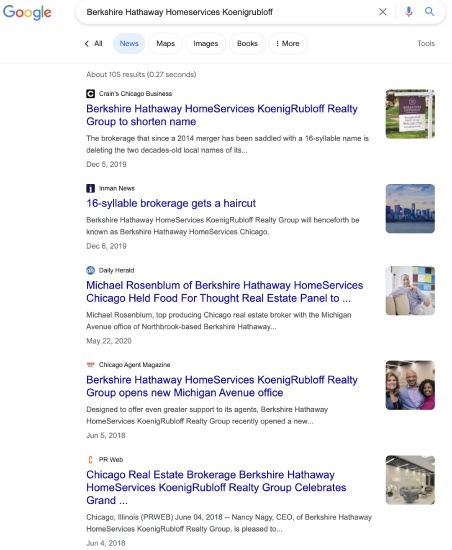
Example brokerage Google search (Source: Google)
A brokerage with many local and national results shows they are well-known and generally respected. However, learning how to choose a real estate brokerage to work for means evaluating each brokerage’s strengths and weaknesses. Many small real estate brokerages have a stronger reputation than the most popular choices, but their publicity will be minimal.
Read Online Reviews
Studies show that up to 94% of consumers said a bad review convinced them to avoid a business, especially for buyers or sellers anticipating the largest transaction of their life. At the same time, online reviews are sometimes only given by people with solid opinions, whether negative or positive, so they should be taken with a grain of salt. However, there should be a concern if the brokerage has many negative reviews.
Don’t forget to pay attention to the source of the reviews you look for. If you’re evaluating a Keller Williams office, nationwide reviews for the brokerage will not give you an accurate understanding of one individual location. Try looking specifically for Google business reviews for the most reliable reviews from clients for individual brokerages.
Most Google reviews are written by clients or people who have worked with the brokerage to buy or sell a home. In addition, it’s also valuable to find any online reviews from agents who previously or currently work for the brokerage from sources like Glassdoor or Indeed reviews. It’s always best to read reviews for the specific location or office you’re evaluating, but reviews for national and franchise brokerages can also help you decide.
Look for Awards & Memberships
Pay attention to any awards or accolades on the brokerage’s website or social media pages. Also, look for any national associations or memberships they are associated with. Not all award-winning brokerages advertise their accomplishments, so search online if you don’t find anything immediately. Being listed on the RealTrends 500 rankings is an excellent indicator of success.

EXIT Real Estate Gallery award (Source: Facebook)
6. Evaluate Additional Success Factors
Once you’ve established a basic understanding of the different types of brokerages and how they may or may not meet your needs, you’ll be able to more accurately and easily evaluate each potential brokerage choice. Many other factors contribute to choosing a real estate company to work for, and with a base understanding of your needs, you’ll be able to start narrowing down the strengths and weaknesses of each. This will dramatically increase your chances of finding success as a real estate agent.
These are some important additional factors to evaluate:
- Fees: Brokerages may charge several additional fees on a monthly or annual basis, and you don’t want to be surprised by your expenses after you’ve signed an agreement. Make sure to get a list of all fees and schedules in writing before choosing a real estate company.
- Contracts: When you select a real estate group or brokerage, you’ll sign a contract stipulating terms. You must read the contract carefully and understand all potential implications to avoid a major problem. Most companies provide a one-year contract, but reading the fine print is the only way to know exactly what you’re agreeing to.
- Lead distribution strategy: Ask each brokerage how they distribute new leads to their agents. Since lead generation is a vital element of a real estate business, their strategy should be clear and easy to understand.
- Market share: Knowing the brokerage’s market share is essential because it can indicate the company’s success. A brokerage with a high number of listings in the market and an evenly distributed number of listings per agent is most likely a great place to work.
- Training plans: Depending on your experience level and needs, a real estate company’s training and mentorship programs can be a deciding factor. In many cases, the lack of support from a brokerage is why real estate agents fail.
- Culture and office setup: Company culture is often overlooked by agents, but happy agents are successful agents. If you feel uncomfortable at the real estate office or find that it doesn’t mesh with your personality, you’ll avoid significant interactions and opportunities for support that can be instrumental in growing your business.
- Online presence: Not all brokerages recognize the importance of building an online presence, but real estate lead generation statistics clearly show that digital and social media marketing is only growing more powerful and effective as time goes on. Even if the audience size isn’t massive, having an active online presence shows that the brokerage is knowledgeable about modern-day marketing and lead generation.
Bottom Line
Choosing the right real estate brokerage for your needs is one of the most significant factors in determining your career success. It can be confusing for new and experienced agents because every brokerage has unique strengths and weaknesses. To learn the best way to choose a real estate company to work for, you must thoroughly evaluate your needs and the brokerage’s offerings and use the evaluation rubric provided.
Frequently Asked Questions (FAQs)
Finding the best places to work as a real estate agent is more than just looking at the average earnings or number of listings on Redfin. It’s also about choosing a place you enjoy and love. Based on population growth and median salary, the following are the top 10 best cities to work as a realtor:
- Virginia Beach, VA
- West Palm Beach, FL
- Austin, TX
- Tulsa, OK
- Denver, CO
- Dallas, TX
- Seattle, WA
- Washington, D.C.
- Las Vegas, NV
- Vancouver, WA
Although certain regions have reciprocity with other states, real estate agents can only work in the state where they possess their licenses. If you are currently enrolled in prelicensing or real estate classes in one state, you should decide immediately whether you want to work there or transfer to a different state.
You’ll have many questions, doubts, and learning experiences during your first year as a real estate agent. In terms of marketing, lead generation, and conversion, you won’t have the resources to compete with the major real estate brokerages when you first start out. To launch your career, you’ll want to employ the brokerage’s tools and methods as well as their assistance in getting your name out there. That is why you must select a real estate brokerage that will walk this journey with you from beginning to end.
